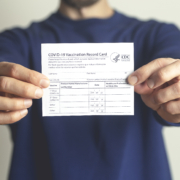Welcome Back, Old Friend – Section 8 of RESPA is a Hot Topic Again
The below article is the Special Focus section of the September 2019 Compliance Journal. The full issue may be viewed by clicking here.
Section 8 of the Real Estate Settlement Procedures Act (RESPA)1 – the prohibition against kickbacks and unearned fees – is back and compliance officers are taking note. In the last year, we have seen a significant increase in RESPA section 8 questions, many of which involve a determination as to whether certain marketing activities are permissible. This is due, in part, to evolving technology which provides a platform to facilitate marketing relationships between settlement service providers, along with recent regulatory and case law developments. Some of these arrangements are simple, while others extraordinarily complex. Either way, I sense bit of panic from compliance officers any time there’s a new opportunity to market the institution’s mortgage area that may implicate RESPA (and for good reasons – penalties and reputation to name a couple!). Not all these arrangements are problematic, especially in light of the recent PHH decision and developments out of the Consumer Financial Protection Bureau (CFPB), but some arrangements should still make your ears perk up.
So, how do we analyze whether a marketing opportunity presents a RESPA Section 8 issue? Let’s discuss.
When we consider marketing activities under RESPA, there are two primary provisions of RESPA Section 8 that are relevant to our analysis: (1) Section 8(a) which delineates prohibited activity,2 and (2) Section 8(c) which prescribes permissible activities.
Sections 8(a)– Prohibited Activity
The first is Section 8(a) of RESPA which prohibits illegal kickbacks – the giving or receiving of a “thing of value” for referrals made between settlement service providers. Specifically, Section 8(a) prohibits any person from giving or accepting any fee, kickback, or thing of value pursuant to an agreement or understanding for the referral of a settlement service involving a federally related mortgage loan (a.k.a. consumer mortgage loans).3 There are three elements to an illegal kickback under Section 8(a):
- A “thing of value” – for example, money, defrayed costs, special contract terms, a promise to provide future referrals, and things (such as sporting event tickets or office supplies);
- An “agreement or understanding”, whether oral, written, or established by practice; and
- A “referral”, which is defined in two ways: (a) oral or written action that has the effect of affirmatively influencing selection of a settlement service provider, or (b) when a person is required to use a particular settlement service provider.
All of these components must be present to be considered a prohibited activity under RESPA. Thus, when a potential RESPA-implicating opportunity presents itself, each of these components must be analyzed in detail.
Section 8(c) of RESPA – Permissible Activity
Notwithstanding the prohibitions in Sections 8(a), the second relevant provision, contained in Section 8(c) of RESPA, sets forth permissible activity. Relevant here, RESPA specifically permits the following:
- “normal promotional or educational activities that are not conditioned on the referral of business and that do not involve the defraying of expenses that otherwise would be incurred…”;4 and
- “payment to any person of a bona fide salary or compensation or other payment for goods or facilities actually furnished or for services actually performed.”5
These permissible activity exceptions are generally relied upon in order to create relationships between settlement services providers (e.g. the institution and a realtor).
Importantly, there are some general principles that have developed over time, via administrative interpretations, case law, and enforcement actions that must be true in order for the marketing activity to be permissible pursuant to one of these exceptions:
- Services must actually be performed or goods must actually be provided. For example, advertising must actually be provided. Any payment for advertising that does not actually occur will be considered an unlawful kickback.
- The payment for such services or goods must be bona fide. That is, payment must be reasonable market value. Any excess payment above reasonable market value will be seen as an illegal kickback.6
Now, assuming the marketing activity meets the parameters of one of the Section 8(c) exceptions, the activity receives a “safe harbor” from a RESPA Section 8 violation. Note, however, that the “safe harbor” rule was not the prevailing opinion of the CFPB under the reign of Director Richard Cordray, which was a significant departure from previous, longstanding interpretations of RESPA under the Department of Housing and Urban Development (HUD). However, in perhaps one of the most contentions of RESPA cases in recent history, PHH Corporation v. Consumer Financial Protection Bureau,7 the Court of Appeals for the D.C. Circuit confirmed that Section 8(c) of RESPA provides a safe harbor so long as the activity meets the parameters of the Section 8(c) exceptions.
Analysis When Considering Marketing Opportunities
With that RESPA background in mind, if your institution is considering a marketing opportunity involving federally related mortgage loans, I suggest engaging in the following analysis:
- Might this be deemed a prohibited activity under RESPA Section 8(a) or 8(b)?
- That is, could this be considered an illegal kickback under Section 8(a) in that all three elements are present, as described above and restated here:
- A “thing of value”;
- An “agreement or understanding”; and
- A “referral”
- Or, is this impermissible fee splitting under 8(b)?
- Though not often arising in the marketing context and, consequently, not thoroughly discussed herein, the institution should consider applicability
- That is, could this be considered an illegal kickback under Section 8(a) in that all three elements are present, as described above and restated here:
If NO, that’s the end of your analysis – no Section 8 concern
If MAYBE or YES, continue to (2) and (3).
- Is the activity “saved” by the Section 8(c) educational and marketing exception; or
- Is the activity “saved” by the Section 8(c) “bona fide payment for services actually performed” exception?
Let’s take a couple of common marketing opportunities and run through the analysis:
Hosting a Complementary Educational Seminar for Settlement Service Providers
If an institution chooses to host a complementary educational seminar for real estate professionals, such an event may be considered to violate Section 8(a) of RESPA because it’s certainly the provision of a “thing of value” provided in hopes of generating business (or, in other words, referrals from those settlement service providers). In fact, previous HUD Guidance states that such educational events implicitly positions settlement service providers to refer business to the institution. We can question whether there is an “agreement or understanding”, but let’s just assume that the conduct is indicative of such. The question then becomes whether this can be redeemed by the “normal promotional and marketing” exception under 8(c).
Whether an educational seminar meets the safe harbor exception is very much dependent upon the facts and circumstances at hand. Consider the following:
- Is the event in any way conditioned on past, present, or future referrals of business? For example, does the institution provide an incentive for attendees to refer business back to the institution? Or, does the institution only invite settlement service providers that have previously referred business to the institution? If so, the safe harbor is unlikely to be met.
- Note that who is invited can make a difference here. The more “open” the attendance list (e.g. not just settlement services providers located near your branches or those who have previously referred business your way), the more likely the seminar is to pass muster.
- Does the seminar defray costs of the attendees? For example, if the seminar provides a course required to receive or maintain licensure, that would be defraying a cost ordinarily incurred and would be, consequently, unlawful.
The most challenging aspect here is to remain referral-neutral. Pay careful to this component in your analysis.
Advertising with a Realtor
Recently, a number of institutions have been given the opportunity to advertise their services on a realtor’s website or jointly advertise with a realtor on a separate platform (e.g. Zillow). I think we could all agree that this is prohibited activity under Section 8(a). Thus, we turn to whether it can be saved under either of the relevant Section 8(c) exceptions delineated above.
Of course, facts matter here. The following should be considered:
- Is the advertising conditioned on past, present, or future referrals of business? For example, if the institution and the realtor enter into a contractual arrangement for direct advertising, does the agreement discuss future business or incentives for referrals? Pay close attention to contract language, if a contract exists, and remain referral-neutral in order to meet the exception.
- Is the institution paying for the advertising? If the advertising is free, this will not meet the exception as the institution’s costs will be defrayed.
- Is the institution paying reasonable market value for the advertising? Assuming the institution is paying for the advertising, is the institution paying reasonable market value? Remember, any payment above reasonable market value will be seen as an illegal kickback.
One of the challenges with meeting these relevant Section 8(c) exceptions is to get the fee structure exactly right. If the institution is obtaining free advertising or is receiving “below market rate” advertising, you run the risk of receiving “defrayed costs” or not making a bona fide payment for the advertising. In contrast, if you pay above market rate, the portion of the payment above market rate kicks you back into prohibited activity under Section 8(a). To this end, we always suggest drafting a business justification to demonstrate that the fee paid is fair market value and maintaining it in your files. To determine market value, we suggest considering the following:
- Look internally for evidence of similar transactions (e.g. is the price similar to the institution’s other advertising costs for the type of media, duration, etc.);
- Look externally to determine if the price is consistent with the price third parties would incur for similar services (e.g. other financial institutions in the area); and
- Management should exercise its best judgment based on the internal and external evidence.
Furthermore, you should be especially careful when navigating joint marketing arrangements when a third party is involved. For example, Zillow offers lenders and real estate agents the opportunity to jointly advertise via the Zillow online platform. In this program, Agent invites up to five lenders to jointly market with Agent. Lender then pays Zillow for the opportunity to advertise with Agent. The advertising fees paid by lender, in turn, reduce the amount the Agent pays Zillow for Agent’s advertising. The more the lender spends, the more often the lender is featured (versus other lenders with whom the Agent advertises). Though this program was being investigated by CFPB for violations of RESPA Section 8 and UDAAP, the investigation quietly concluded and Zillow announced in a June 2018 SEC filing that the company had received a letter from the Bureau indicating that it would not be pursuing enforcement action.
The Zillow case is comforting to institutions insomuch as the CFPB validated that these types of marketing arrangements can lawfully exist. However, they do not come without scrutiny. In these types of arrangements, institutions should pay considerable attention to how the fee structure flows through the parties, in addition to the considerations above. In my experience, these arrangements can be incredibly complex and always invite risk. It’s prudent to get legal counsel involved before agreeing to participate in this kind of arrangement.
To conclude, RESPA Section 8 questions can be complex, rife with competing interpretations from HUD, CFPB and the courts, and require wading through unchartered waters with ever-changing leadership at the CFPB. Given that penalties are steep, as permitted by statute – recent RESPA CFPB enforcement actions have imposed penalties ranging from $35,000 to $265,000 and the amount at issue in the PHH case was $109 million – these questions deserve attention, thorough analysis, and often times, involvement of counsel.
WBA wishes to thank Atty. Lauren C. Capitini, Boardman & Clark, llp for providing this article.
- 12 U.S.C. § 2607. Implementing Regulation X is codified at 12 C.F.R. § 1024.14.
- Note that section 8(b) prohibits the giving or accepting of a “portion, split, or percentage of any charge made or received” for rendering settlement services other than for services actually performed. In other words, institutions cannot share a portion of or split fees with other settlement service providers when rendering settlement services unless the payment given/received is for “services actually performed”. Though a very important component of RESPA to understand, this provision is not often relevant in the marketing context.
- 12 U.S.C. § 2607(a) and 12 C.F.R. § 1024.14(b).
- 12 C.F.R. § 1024.14(g)(1)(vi).
- 12 C.F.R. § 1024.14(g)(1)(iv).
- See PHH Corporation v. Consumer Financial Protection Bureau, 839 F.3d 1 at 41 (D.C. Cir. 2016).
- 839 F.3d 1 (D.C. Cir. 2016). The court’s interpretation of RESPA was upheld by a petition for rehearing en banc by the D.C. Circuit Court of Appeals. PHH, No. 15-1177 (Jan. 31, 2018).
By, Ally Bates





